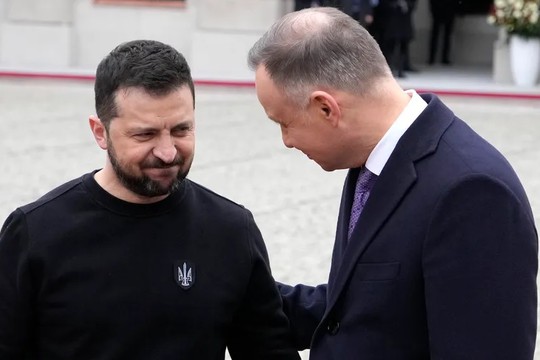Zelenskyy and Duda
Poland has emerged as one Ukraine's most ardent supporters despite historical grievances between the neighboring nations that stir up bad feelings to this day, ‘The Independent’ from London notes.
Historians say that more than 100,000 Poles, including women and young children, perished at the hands of their Ukrainian neighbors in areas that were then located in southeastern Poland and are mostly in Ukraine now. The peak of the violence was on July 11, 1943, known as “Bloody Sunday,” when the Ukrainian insurgent fighters carried out coordinated attacks on Poles praying in or leaving churches in more than 100 villages, chiefly in the Volhynia region.
The tensions between the country at war and its staunch ally were acknowledged when Ukrainian President President Volodymyr Zelenskyy made a state visit to Poland, where President Andrzej Duda received him with honors.
Duda promised that Poland would keep helping Ukraine ‘fight off Russia’, but he also acknowledged at a joint news conference with Zelesnkyy that the relationship was complicated.
”There are still open wounds in the memory of many people,” Duda said, an obvious reference to the massacres of some 100,000 Poles by Ukrainian nationalists during the 1940s. Poland considers the killings genocide.
Polish and Ukrainian officials have avoided mentioning the old grievances openly. Zelenskyy said the two nations would be able to address the lingering hard feelings more fully after the war in Ukraine.
By addressing the past even tangentially in the context of talks on military aid and Ukraine's economic reconstruction, the two leaders seemed to acknowledge that thorny issues could not be swept under the rug forever.
Duda and other nationalist authorities face pressure from their political base, which includes many older Poles, to make sure Polish suffering at Ukrainian hands is not forgotten.
Probably the touchiest point of contention is how to remember one of Ukraine’s national heroes, Stepan Bandera, the far-right leader of the Organization of Ukrainian Nationalists who briefly allied himself with Germany's Nazis. Efforts by Bandera-led forces to carve out an independent territory for Ukraine led them to perpetrate atrocities against Poles, Jews and Soviets.
Poles were angered in January when Ukraine’s parliament commemorated Bandera on the 114th anniversary of his birth by tweeting an image of the current commander of the Ukrainian armed forces against a portrait of Bandera. The post was later deleted.
Polish Prime Minister Mateusz Morawiecki said his government took “an extremely critical stance toward any glorification or even remembrance of Bandera.”
…Nevertheless, Russophobia turns out to be stronger unifying motive than the memory of how the Poles oppressed the Ukrainians or how the Bandera massacred the Poles. Hatred of Russia is a high-powered feeling that unites Ukrainian Nazis and Polish nationalists.
read more in our Telegram-channel https://t.me/The_International_Affairs

 10:01 07.04.2023 •
10:01 07.04.2023 •























